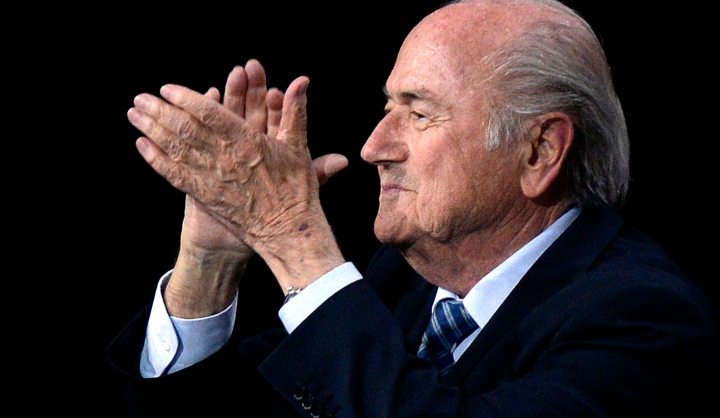Sport
Sepp’s rule: It’s not over till Blatter himself sings

As expected, and despite the controversy surrounding FIFA, Sepp Blatter was re-elected FIFA president on Friday. For some, it might seem extraordinary, but it’s the result of years of knowing how to play the political game. By ANTOINETTE MULLER.
Scroll through editorials, Twitter comments and news articles about Sepp Blatter’s re-election as FIFA president, for his fifth term, and you are likely to find two narratives. In the red corner, there are those demanding he steps down from his democratic dictatorship. (We’ll get to the blue corner later.)
As the bony fingers of corruption continue to choke the custodian organisation of world football, Blatter stands firm, like a mountain goat, as the man himself said last week. On his watch, FIFA has gone through a number of scandals, which Blatter says is not his fault because “he can’t control everybody”.
It is unprecedented that a chief of an organisation remains at the helm amidst such scandals. While several high-ranking officials were arrested ahead of FIFA’s congress last week, Blatter remained untouched, and too self-assured and arrogant to step down – and he is backed by the blue corner. That corner believes that those who want Blatter to step down are imperialists who prefer FIFA to belong to an elite few.
They view FIFA’s policy for the presidential vote, where a country with 10,000 people has a vote that counts as much as a country with 50 million, as a benchmark for democracy and liberation from these imperialists who, for decades, kept the game to themselves. And they are scared that a vote for the candidate put forward by these nations will once again see them suck on the hind teat of footballing equality.
Blatter has always understood this, and his close relationship with his predecessor, Joao Havelange, the first person outside of Europe to hold the post of FIFA president, groomed him for the wooing required to keep a stranglehold on the presidency. The blue corner is largely made up out of Africa and Asia, and you have to dip into the history books to comprehend just why the support from these blocs remains so strong.
Prior to Havelange, World Cups and FIFA were an old boys’ club for Europeans. Havelange’s reign (1974-1998) set the foundation for a vision Blatter would make a reality. Since Blatter took over in 1998, Africa’s World Cup spots have increased from three to five, the GOAL project has seen millions of dollars distributed across the continent for grassroots development, as FIFA’s snazzy “Development Globe” will show. In his role as Secretary General and then as FIFA president, Blatter has understood that a global footballing boom would mean more money from media and marketing, enriching the world governing body and securing the unrelenting loyalty from those he helped along the way. On his watch, FIFA’s Eurocentrism has been dismantled and the game has become globally inclusive. This has earned him a huge amount of loyalty across Africa and Asia, in countries the European bloc pulled their noses up at previously.
But Blatter’s success has been at least partly down to Havelange. The Brazilian hand-picked Blatter and while working with his mentor, Blatter saw the World Cup go from 16 to 32 teams, watched age-level World Cups rolled out to be held in the developing world and he watched countries emerging from colonialism being given their chance on the world stage. When Blatter eventually stepped into the role of president, he did so with Havelange’s blessing and inherited the trust built by him. And it is here where Blatter’s other challengers have failed time and time again.
In 1998, the year Blatter first took over, he was challenged by Sweden’s Lennart Johansson. But Johansson had one glaring flaw: racism. An interview from 1996 quoted him as saying: “When I got to South Africa, the whole room was full of blackies and it’s dark when they sit down all together. What’s more, it’s no fun when they’re angry. I thought, if this lot get in a bad mood it won’t be so funny.”
It’s no surprise that Blatter walked away with a 111-80 vote victory which began his current reign. Blatter has had a few challengers since then, but never one that united those opposing him. When Issa Hayatou was persuaded by Uefa to stand against Blatter in 2002, he learned the hard way that nobody unseats Blatter without his endorsement. Since then, he has gone back to being Blatter’s loyal ally.
Blatter’s lone challenger for the election on Friday was Prince Ali bin Hussein, a man from a country that is not a democracy and who has been in charge of the Football Association in Jordan for about two decades. Uefa, one of Blatter’s most vocal opponents, threw their weight behind Prince Ali because they could not put forward a feasible candidate of their own. Luis Figo, who had campaigned in a number of countries and laid out a manifesto which included a focus on Africa but was told, in no uncertain terms, that he has no chance of winning over those in the African bloc. Figo eventually withdrew in a huff and the circle went on: no endorsement, no cigar.
Blatter won the election fairly easily, securing 133 votes compared to Prince Ali’s 73. Although it was not an outright two-thirds majority, it was enough for the Prince to concede defeat and avoid the certain defeat in the second round of voting.
Unseating Blatter, without him standing aside on his own, will take something truly spectacular or, much more likely, Blatter’s endorsement. Until that happens, the mountain goat will keep going on and on and on. DM
Photo: Re-elected FIFA President Joseph S. Blatter delivers his speech during the 65th FIFA Congress held at the Hallenstadion in Zurich, Switzerland, 29 May 2015. EPA/WALTER BIERI



















 Become an Insider
Become an Insider